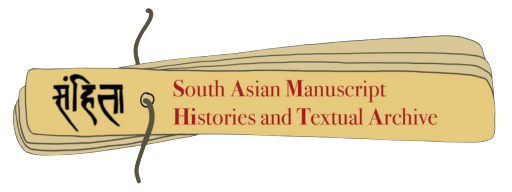Manuscripts
Search Filter
Tripura Mantrabheda Prakāśa
EAP1023/19/14 Language : Sanskrit Scripts : Devanagari
Tripura Mantrabheda Prakasha is in Sanskrit written in Devanagari script written by Ramachandra.
Badarī Māhātmya
EAP1023/19/16 Language : Sanskrit Scripts : Devanagari
Badari Mahatmya is a part of Skanda Mahatmya. In the dialogue between Lord Shiva and Skanda, Shiva told about Badarikashrama. The sacred place of Badari is beginningless like the Vedas where Hari Himself is the presiding deity. This book glorifies.
Mayūracitra
EAP1023/19/17 Language : Sanskrit Scripts : Devanagari
This is a astrological text in Sanskrit. Folios after 21 are missing. This is an important text for astrologers
Daśa Slokī
EAP1023/19/18 Language : Sanskrit Scripts : Devanagari
Dasa Sloki or Nirvana Dasakam is authored by Adi Sankara. Those verses of philosophy is the essence of the thoughts of Sankara, the philosopher. There are two stories about its origin. One says that when Adhi Sankara approached Sage Govinda Pada and requested him to make him his disciple, then it seems Govinda Pada asked the young boy, “Who are you?” and this is his reply. Another story tells that when Sankara said that he is about to leave this earth, his disciples wanted to tell them all his teachings in a summary form and this is the reply. Swami Madhusudhana Sarawathi has written a commentary called “Sidhantha Bindu” on these ten verses. The first verse goes like -.
Gayatrī Kavaca
EAP1023/19/19 Language : Sanskrit Scripts : Devanagari
Shri Gayatri Kavaca is in Sanskrit. It has arisen in the conversation in between Brahmarshi Narad and Narayana. The Kavaca is believed to be very pious and removes all bad omens and bring success. It removes all the sins who recite or listen it every day. This Kavaca also protects devotees .
Setu Māhātmya
EAP1023/19/20 Language : Sanskrit Scripts : Devanagari
Skanda Purana [Skandapurāṇa]’s third book among the seven, Brahmakhandam, opens with a section, which is famous as Setu-Mahatmya, and dedicates this section spanning over fifty-two chapters to describing in detail, the significance of Rama Setu, its various aspects and its history throughout the ages. This Setu Mahatmya has fifty two Chapters.
Saravsvatī Stava
EAP1023/19/21 Language : Sanskrit Scripts : Devanagari
This is the Stotra or pray of Sarasvati, the goddess of knowledge, music, art, wisdom, and learning.
Vivāha Vara Pujā Vidhi
EAP1023/19/22 Language : Sanskrit Scripts : Devanagari
In the Hindu weddings, groom is considered as the Lord Mahavishnu and bride as Lakshmi They are worshipped accordingly. This text elaborates specific Puja ritual for the groom. This Puja is called 'Varani'.
Rāmāryāśanamaṣādhikaṁ Stotra
EAP1023/19/23 Language : Sanskrit Scripts : Devanagari
It is written by Mugdala Bhatta. It is in Sanskrit and written with Devanagari script.
Rudra Paddhati
EAP1023/19/24 Language : Sanskrit Scripts : Devanagari
Rudrapaddhati [Rudrānuṣṭhānapaddhati] is the name of a work ascribed to Nārāyaṇa-bhaṭṭa, a sixteenth century Indian scholar and author of Sanskrit prosody as well as a celebrated authority on Dharmaśāstra. This manuscript is the ritual of cnsecration of Mahadeva.
Vedānta Paribhāṣā
EAP1023/19/25 Language : Sanskrit Scripts : Devanagari
Vedanta-Paribhasha is an epistemological work on Advaita Vedanta It is authored by Varadarajaaraja Dikshita. The author is believed to have lived in the seventeenth century. In this work he has adopted the method and phraseology of Navya-Nyaya, introduced by Gangesa Upadhyaya in the fourteenth century.













